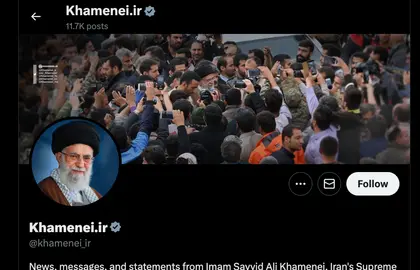Billionaire Elon Musk faced a firestorm of criticism on Friday after his company X, formerly known as Twitter, granted verified status — represented by a gray checkmark — to Iranian Supreme Leader Ali Khamenei’s account, just days after Iran-backed terrorists attacked Israel.
As the death toll in Israel continues to rise, now is hardly the time for X to offer legitimacy to the world’s top state sponsor of terror.
JOIN US ON TELEGRAM
Follow our coverage of the war on the @Kyivpost_official.
Khamenei has been known to use X to pen hate-filled messages, particularly toward Israel. He has repeatedly referred to the Jewish state as a “cancerous tumor,” calling for it “to be removed and eradicated.”
To try to achieve that goal, Tehran has provided weapons and other aid to various terror groups surrounding Israel, including Hamas and Islamic Jihad, which massacred more than 1,000 Israeli and foreign civilians in their October 7 attack.
X has not heeded calls to have Khamenei’s account or its content removed for violating the company’s rules, which supposedly restrict hate speech. This refusal, follows X’s recent history of its lax treatment of antisemitic content.
In September, over 160 Jewish leaders signed a letter condemning Musk for allowing X to “become a breeding ground for some of the most dangerous antisemitic discourse in America.” Musk, in turn, threatened a lawsuit against the Anti-Defamation League, an organization dedicated to fighting antisemitism, blaming the group for a precipitous drop in advertisement revenue for the site.

China, EU, Ukraine Leaders Take Davos Stage Under Trump Shadow
Musk, a self-proclaimed “free speech absolutist,” claims to tolerate the likes of Khamenei out of deference to freedom of speech. But freedom of speech, at its core, protects individuals voicing their opinions from punishment by the government. Conversely, authoritarian regimes, from Iran to Russia to China, are exploiting free-speech protections to weaken democratic countries by flooding social media platforms with disinformation that sows distrust in their institutions and fellow citizens.
Musk, with his misguided concept of free speech “absolutism,” is helping these regimes accomplish their goals. In so doing, he is actually helping to undermine freedom of speech around the world by giving autocrats a way to push their narratives directly into democratic societies.
X’s policy is not only misguided — it is also inconsistent. Defending his decision to give Khamenei’s account a verified status, Musk argued that X applies “the UN rule to world leaders: if the UN recognizes someone, then we will.” He stressed that this policy “is obviously not a moral verdict in any way, but simply recognizes what the international community views to be accurate.” He also argued the status is “important for minimizing impersonation risk.”
But if X is merely reflecting “what the international community views to be accurate,” why does it, for example, give a gray checkmark to the Russian Ministry of Foreign Affairs account for Sevastopol, part of the illegally occupied Crimean Peninsula? That account has been marked as “verified” since October 2015, a year and a half after Russia seized the peninsula from Ukraine. Although Russia has annexed Crimea, that move was illegal under international law and was not recognized by the United Nations.
Musk seeks to be a "free speech absolutist" while also catering to autocrats. However, he must make a choice: use international recognition as granted by entities, such as the UN, or create his own, fully-defined and readily understandable hybrid method. However, seeking to do both is untenable.
Even worse than the lack of clarity, however, is X’s decision that effectively caters to terrorists and rogue regimes while they perpetrate unspeakable crimes against the people of Israel and Ukraine.
If Elon Musk truly cares about free speech, he should not give the platform to Khamenei who stifled the freedom of speech in Iran. Now, Musk should put his money where his mouth is and permanently ban Khamenei’s account for inviting violence and spreading hateful content, which violates X’s rules.
The views expressed in this opinion article are the author’s and not necessarily those of Kyiv Post.
Jason Smart is a special correspondent for KyivPost. Ivana Stradner is a research fellow at the Foundation for Defense of Democracies.
You can also highlight the text and press Ctrl + Enter










